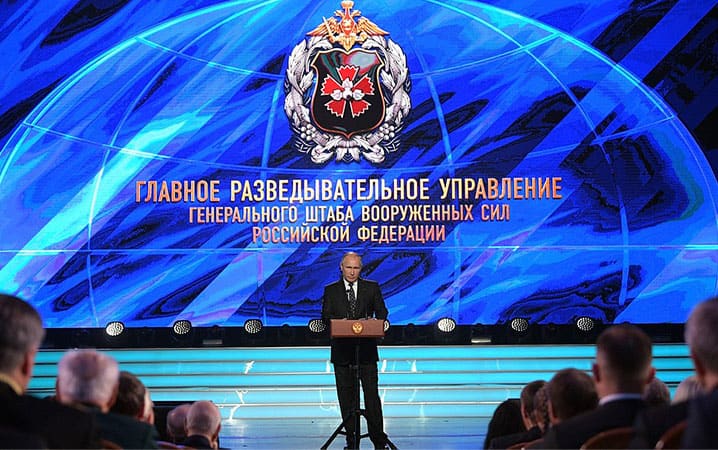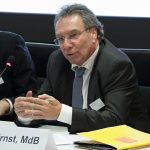Russia remains one of NATO’s main threats despite attempts by the French President Emanuel Macron to divert Europe’s attention from the Kremlin to the terrorism threats at the eve of the Alliance’s summit in London.
Britain and its NATO allies have already voiced specifically against Russia, ‘Russia’s aggressive actions constitute a menace to Euro-Atlantic security’.
Tighter rhetoric against Russia at the London summit is taking place against the backdrop of the two Russian military intelligence officers deported from Germany because of the investigation of a case of Chechen-origin Georgian citizen Zelimkhan Khangoshvili murdered in Berlin. Berlin suspects Moscow’s intel or the Chechen authorities of the murder.
Since the annexation of Crimea, Russia has stepped up special intelligence operations in Europe. Looking at the infographic you can see the Russian special services’ most resonant ops of terrorist signature.

On 4 March 2018, Sergei Skripal, a former Russian military officer and double agent for the UK’s intelligence services, and his daughter Yulia Skripal were poisoned in Salisbury, England, with a Novichok nerve agent, according to official UK sources and the Organisation for the Prohibition of Chemical Weapons (OPCW).
A coup d’état plot in the capital of Montenegro, Podgorica, was planned and prepared for 16 October 2016, the day of the parliamentary election, as Montenegro’s special prosecutor says. The Montenegro court sentenced two Russian military intelligence operatives Eduard Shishmakov and Vladimir Popov and 11 others to up to 15 years in prison.
Bulgarian arms dealer Emilian Gebrev survived the April 28, 2015, poisoning attempt in Sofia.Bulgarian authorities were investigating a possible connection between a nerve agent attack on a former Russian spy in England in 2018 and the poisoning of an arms dealer in Sofia in 2015. 8 Russian mil intel agents were named to be connected to Bulgaria poisoning. Denis Sergeyev was one among them.
Spain counterintelligence named the same suspect, Denis Sergeyev, in its probe of Russia’s role in Catalonia’s rejected 2017 independence referendum. Spain’s High Court, the Audiencia Nacional, has opened an investigation into the alleged activities of a group associated with the Russian intelligence service during the 2017 Catalan breakaway bid.
Russian influence was noticeable during riots in Barcelona at Al Prat airport.
French security services are investigating any Kremlin role in social media activity that has amplified the yellow-vests movement and spread misinformation about it.
Seven Russian intelligence officers were charged by the grand jury of the Western District of Pennsylvania for computer hacking, fraud, identity theft and money laundering. As the prosecutor stated hacker attacks against anti-doping institutions, as well as organizations investigating allegations of chemical weapons against Russia, were carried out between December 2014 and May 2019. They were conducted with a ‘field trip’ from the territory of different countries.
Establishing A2/AD zone over Donbass GRU operation was finished with shooting down MH17 civil plane in summer 2014 that resulted in nearly 300 killed passengers.
The Russian special services turned Europe, in particular France, into a transshipment base for agents and an operation zone for carrying out subversive ops against democracies and figures unwanted by the Kremlin.
A group of over a dozen Russian spies associated with the elite military intelligence unit carrying out operations in Europe including the attempted poisoning of defector Sergei Skripal used a French alpine region as a rear base, a report said. The Le Monde daily said an investigation by British, Swiss, French, and US intelligence had drawn up a list of 15 members of the 29155 unit of Russia’s GRU military spy agency who moved within Europe from 2014-2018.
According to unclassified CIA report, 1986, Russian, so as Soviet leaders’ approach to terrorism, derives from their broader view that violence is a basic, legitimate tool of political struggle to be applied or sponsored in those settings where Russia will benefit. As a result, Russians have no moral compunctions about supporting foreign insurgent and terrorist groups; the primary consideration is whether the activities of these groups follow Russia’s interests.
Russians support some groups openly and directly, mainly, those with some claim to international political legitimacy.Russia’s view on violence as a legitimate form of political action is also demonstrated in Russia’s (USSR’s) history of involvement in assassinations of political enemies outside its borders. The targets have generally been Russian (Soviet) and latterly, East European defectors and emigres rather than foreign figures.




